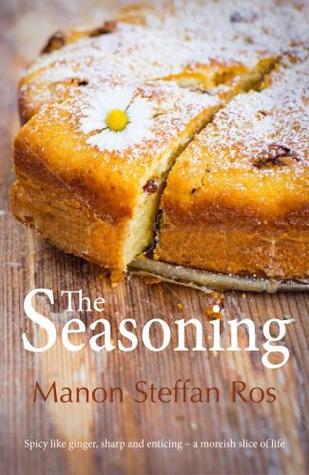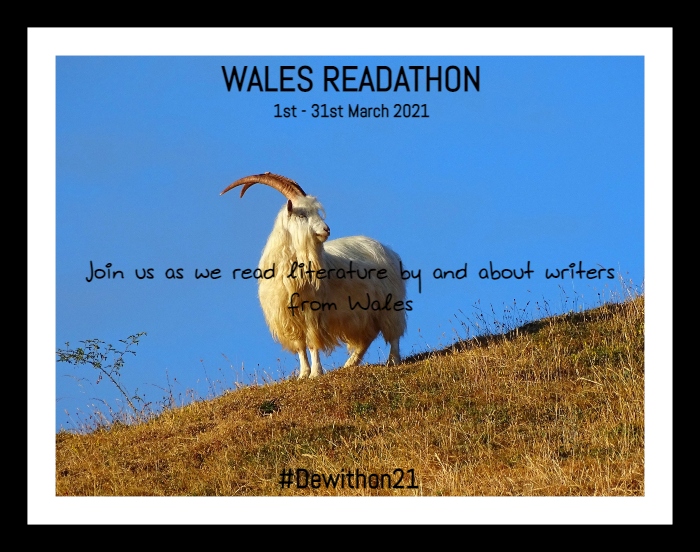Wanting to read at least one book for this year’s Dewithon, hosted by Paula on Book Jotter, I cast around for something that might work at this time when my normal reading patterns remain fragile. I settled on The Seasoning by Manon Steffan Ros. Blasu, to use its original title, was written in Welsh and published in 2013 when it won the fiction prize of the Wales Book of the Year awards. Ros’s English translation was published in 2015 as The Seasoning.
I anticipated a warm and simple read. The story is essentially the narrative of Peggy’s life – lived almost entirely in her native village in north Wales – and is presented in retrospect as is often the case. At her eightieth birthday party, Peggy is given a beautiful notebook by her son, who asks that she records her life story. Peggy struggles to respond. The key which unlocks the story of her life is a recipe she finds tucked in a drawer. Food was hugely important to Peggy. Peggy’s life is then revealed, chronologically, by those who have populated it, each one prefaced by a recipe which featured in that person’s connection with her. A simple structure, it seemed to me, indicative of a straightforward and cosy tale. On some levels it is just that.

Simplicity at its best belies what lies beneath. There is a darkness to Peggy’s life; the book touches on a number of difficult contemporary themes. I’ve encountered books where such themes feel shoehorned into the story for dubious reasons. In The Seasoning, I felt these themes were handled deftly, with a light and compassionate touch.
One storyline did feel too easy: what I know to be a lengthy, often challenging and uncertain process felt too simple, too off pat. Some choices in the translating jarred for me. One word in particular and certain descriptions of Peggy felt over-used; I wanted variety, a richer recipe.
So yes, there were flaws but they were far outweighed by the reading experience as a whole. This is a book to be read slowly – indeed, to be savoured as befits the foodie allusions. I am not Welsh of course, but I felt its Welshness. Not just in the sense of community it conveys or in its overtly Welsh references, but in its heart and soul. For me, it is a book with soul. It is peppered with sadness, spiced with joy, salted with melancholy, leavened by humanity. I finished it with a gentle sigh and the knowledge that I shall read it again.
Manon Steffan Ros has written numerous award-winning novels for children and adults. I would love to read more from her. No doubt there are reasons why more of her work is not (yet) available in English. Her most recent book, Llyfr Glas Nebo, has won many awards. It already has an English title and it seems that an English version will come. A short video of Manon is here, in which she reads an extract from this book in Welsh, which is beautiful to hear, followed by a longer extract in English. Publication can’t come soon enough for me.
I’m also delighted to have been reminded of Honno, who published The Seasoning. Many more of their titles are now on my wishlist.

My thanks to Paula for once again hosting this event.

I’ve never heard of this writer. I think she seems to be someone to bookmark for later, rather than for me to hunt out this minute. As you’ll see on Six Degrees, I’ve done a fair bit of Dark lately, and maybe that’s more than enough for now. But bookmark her I will. Having said that, I find she is in our library system, so maybe … soon!
LikeLiked by 1 person
I’m not convinced she will be your sort of writer, Margaret. But there’s only one way to find out and if the book’s in the library system there’s nothing to lose. At the right time of course!
LikeLiked by 1 person
I had a hunch she might not be. But that’s what library books are for!
LikeLiked by 1 person
Lovely review, Sandra! I think you mentioned this book in your Six Degrees chain? I have noted it down for a later occasion. It is embarrassing to admit, but I don’t think I’ve ever read a Welsh book. And I like the idea of including recipes, which connect to certain people and events.
LikeLiked by 1 person
Yes, it was in the chain, Stargazer. I don’t know if this would be your sort of thing but Welsh literature is definitely worth exploring 😊
LikeLiked by 1 person
I do like the sound of this, especially as I can add it to my books in translation list. I think that the only Welsh author I’ve read is Alan Garner, but there may be others that I didn’t realise were from Wales. There’s a copy in my local library too.
LikeLiked by 1 person
It’s great to hear that the libraries have this one, Katrina. Mine is good but doesn’t hold this one unfortunately. She is a contemporary author, writing in a spare, poetic style. I’d be interested in your thoughts if you do get around to reading it.
LikeLike
They aren’t allowing us to put requests in at the moment but I’ve bookmarked it on their site so I don’t forget!
LikeLiked by 1 person
I enjoyed your review and will look for this book, perhaps to read in lighter times as Stargazer suggests. 🙂
LikeLiked by 1 person
Indeed. It’s not a difficult or depressing read, just incorporates sad themes. Unfortunately Cornwall libraries don’t hold this one. Overall, I find our library stock very good.
LikeLiked by 1 person
A splendid review, Sandra. Thank you so much. 🤗
LikeLiked by 1 person
You’re welcome, Paula. Just squeezed it in! I hope to catch up on the other reviews soon.
LikeLiked by 1 person
Sounds exactly like the kind of books right now. Many of us have been distracted this year and not quite up to rigarous reading. May next year be better!
LikeLiked by 1 person
Yes indeed, Laurie. May next year be better!
LikeLiked by 1 person
Lovely, enticing review , Sandra, and , as most of your readers say, one to keep in mind for future reading. The current reading pile is in danger of bringing the house down! Of Welsh authors, of course, I am enamoured of Owen Sheers. xxx
LikeLiked by 1 person
Another Sheers fan here, as you know! xx
LikeLike
A thorough, thoughtful review
LikeLiked by 1 person
Thanks Derrick. And rather shorter than my usual waffle too!
LikeLiked by 1 person
🙂
LikeLiked by 1 person
I like the idea of this, incorporating recipes with memories seems such a natural thing to do. I’ve added it to my list and will also have a look at Honno who are completely new to me, thanks Sandra!
LikeLiked by 1 person
I think of novels with recipes included as comfort reading – ‘cosy’ stories. These recipes are not necessarily things one might wish to try cooking and the book overall is not what I’d consider to be cosy or comforting. But it is essentially uplifting, showcasing what love can do for the human spirit I suppose. (I should have written that in the review!)
LikeLike
It’s just the act of making food isn’t it, so central to caring for ourselves and others?
LikeLiked by 1 person
Yes, that’s it exactly Jane 😊
LikeLike
I agree with Jane, stories, food and recipes go together in my mind too. We name certain recipes after the family member who loves them best, there are recipes that are always made for particular events and foods that trigger our family stories. I added The Seasoning to my list but it isn’t available in my library, not sure if it will come my way or not.
Your sentence “peppered with sadness, spiced with joy, salted with melancholy, leavened by humanity” was a delight 🙂
LikeLiked by 1 person
Thanks Rose 😊 I read it on kindle. Wouldn’t it be great if we could share books electronically!
LikeLiked by 1 person
I have to join the modern age at some point and start reading electronically but I’m still resisting. I’m on my computer for so long at work each day that I can barely stand more screen-time outside of work. Perhaps once I’ve retired.
But I take your point, if I want to read this and other books at some point I’ll have to start.
LikeLiked by 1 person
I admire your stand, Rose. I flit between kindle and ‘proper’ books. It happens at the moment that I’m on a heavily weighted kindle spree. There are pros and cons to both of course but I can’t ever imagine giving up real books whilst I could live without electronic reading. (I’d probably save a lot of money too.)
LikeLiked by 1 person
I might give this one a go. As you say in your comment on my review for The Life of Rebecca Jones, it seems a contrasting companion to Price’s book. It’s in our library as an ‘electronic resource’ – I haven’t borrowed an ebook from the library yet. I shall investigate!
LikeLiked by 1 person
Given the choice, I would read this one ahead of your one. 😀 From yours and Chris’ reviews I anticipate Rebecca Jones having more depth. Without wishing to denegrate The Seasoning, which is a prize-winner after all, I suspect it will not be your sort of book, Jan. But if you can get it electronically for free, what is there to lose!
LikeLike
Ha! I understand, and will approach it forewarned and forearmed! I’ve had a look at Book Box, the service my library uses. It doesn’t work with Kindle and the recommended app would have to go on my phone. I’m weighing up downloading Adobe Digital Editions and having to read on my laptop, because I find my phone screen too small to read books on. I spend too much time staring at backlit screens as it is, so I’m a bit reluctant.
LikeLiked by 1 person
Interesting. My library also uses Book Box and I’ve decided it’s not worth it. I read some books on my laptop using The Pigeonhole (may interest you?) but I dislike reading on my phone for the reason you give. At the moment I’m heavily into Kindle reading but I flit back and forth between that and ‘proper’ books 😊
LikeLike
I haven’t picked up my Kindle for ages – I’m making the most of not being on a bus for 80 minutes of each working day and enjoying the tactile experience of paper.
I’d wondered about trying to convert the ePub file to Mobi using Calibre, but it feels like too much effort! Plus, a library ebook probably has digital rights management blockers to prevent copying.
Maybe one holiday in Wales I’ll find The Seasoning in a secondhand bookshop!
LikeLiked by 1 person
Ah, the prospect of a secondhand bookshop! One Day!
LikeLike
I love the title and it sounds like an interesting read.
LikeLiked by 1 person
I enjoyed it, Andrea. A gently haunting read.
LikeLiked by 1 person
I enjoyed reading your deft review. Thanks Sandra.
LikeLiked by 1 person
You’re welcome, Carol. Glad you enjoyed it.
LikeLiked by 1 person
I’m currently on an online writing course where Manon is the tutor and thoroughly enjoying it.
LikeLiked by 1 person
I’m very envious!
LikeLike